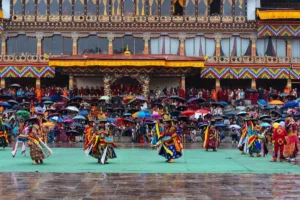The prehistoric period of Bhutan remains vague, as most of the ancient records that were kept in Punakha got destroyed in a massive fire in 1827. However, Bhutan was a remote country with numerous minor rulers and villages scattered across the country of dense wild forests. There was hardly any modern development in the early 18th century but it was when the British colonized India, that the Indo-Britain government agreed with Bhutan to grant an annual subsidy in exchange for surrendering some borderlands in 1865. (Wangchuk Dynasty)
Britain also prompted an assembly of eminent Buddhist monks, government officials, and heads of important families to unanimously select Ugyen Wangchuck as the hereditary king of Bhutan, in 1907.
Subsequently, Bhutan thereby agreed to follow Britain’s guidance in its foreign relations with an exception to its traditional relationship with Tibet.
After the independence of India from the hold of British rule, on August 15’ 1947, India not only assumed the role of Britain in assisting Bhutan but also signed a formal indo – Bhutanese treaty in 1949 wherein India returned the land of Bhutan that was amassed by Britain. At the same time, India agreed to grant annual subsidies and formalized its responsibilities in defense and foreign relations with Bhutan.
The third king of Bhutan, Druk Gyalpo Jigme Dorji Wangchuk constituted a 130-member National Assembly to introduce a mock democratic form of government in 1953 he also discarded the policy of self-imposed isolation in international affairs. Subsequently, Bhutan became a member of regional and international organizations. His successor King Jigme Singye Wangchuck transformed an absolute monarchy into a constitutional democracy empowering the National Assembly to impeach the King by a two-thirds majority.
The first parliamentary election was held in December 2007 and March 2008.
Accordingly, he crowned his eldest son, Jigme Khesar Namgyal Wangchuk as the fifth King of Bhutan in November 2008. It may be interesting to note that the fourth king of Bhutan, Jigme Singye Wangchuck took a unique initiative to introduce the objective of national development was not primarily increasing the Gross Domestic Product (GDP) but Gross National Happiness (GNH) in the 1970s. He sincerely believed that economic development alone couldn’t necessarily bring about happiness among the citizens. His wise policy and aspects have also been followed by his successor King Jigme Khesar Namgyal Wangchuk, popularly known as King Khesar.
